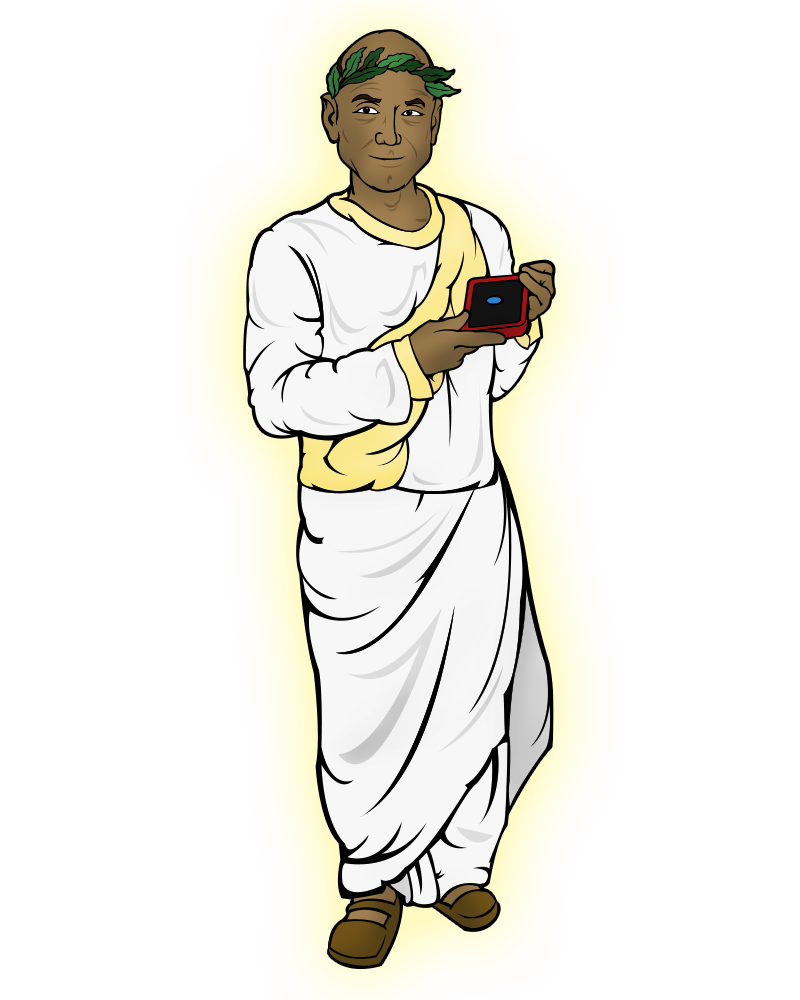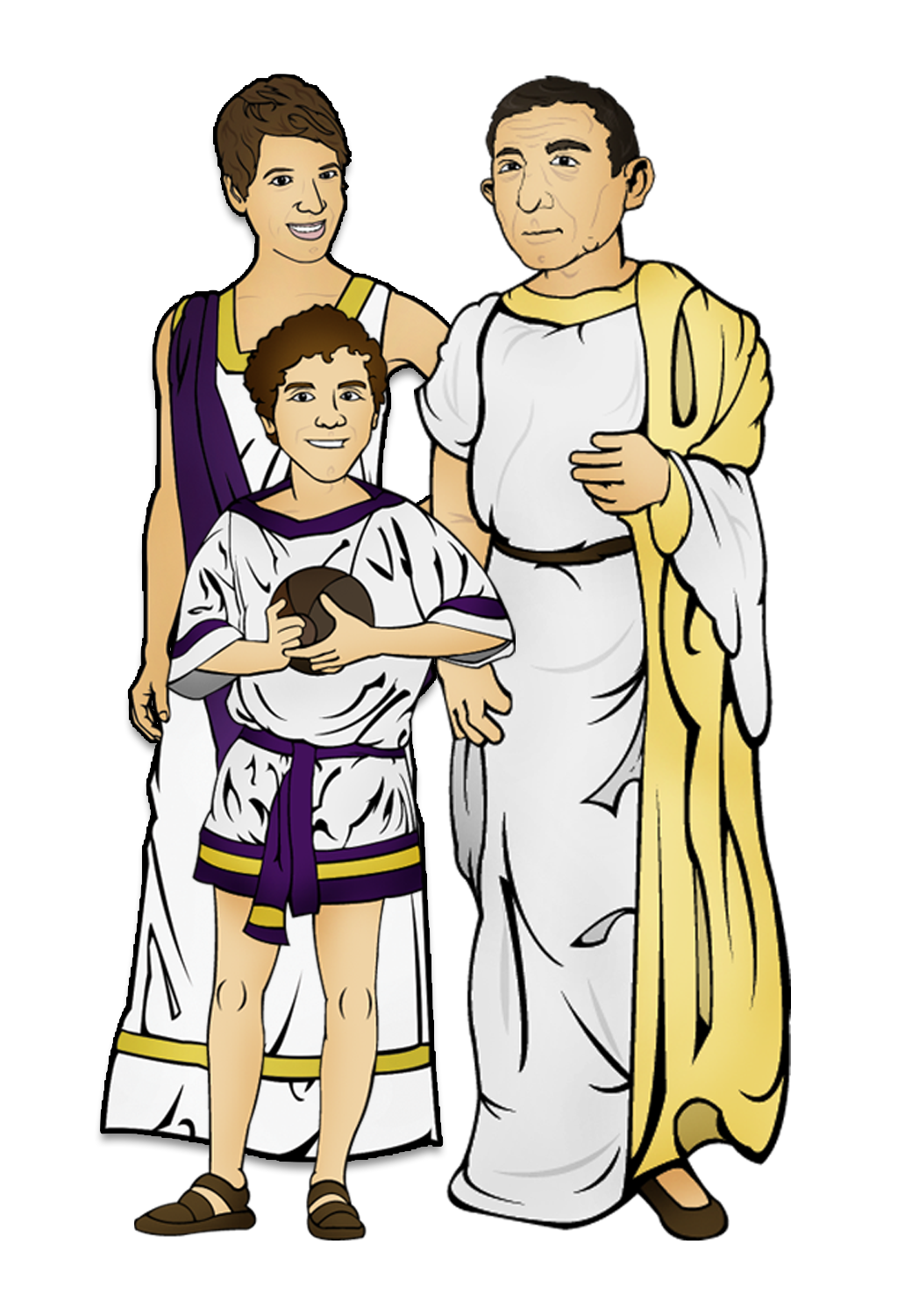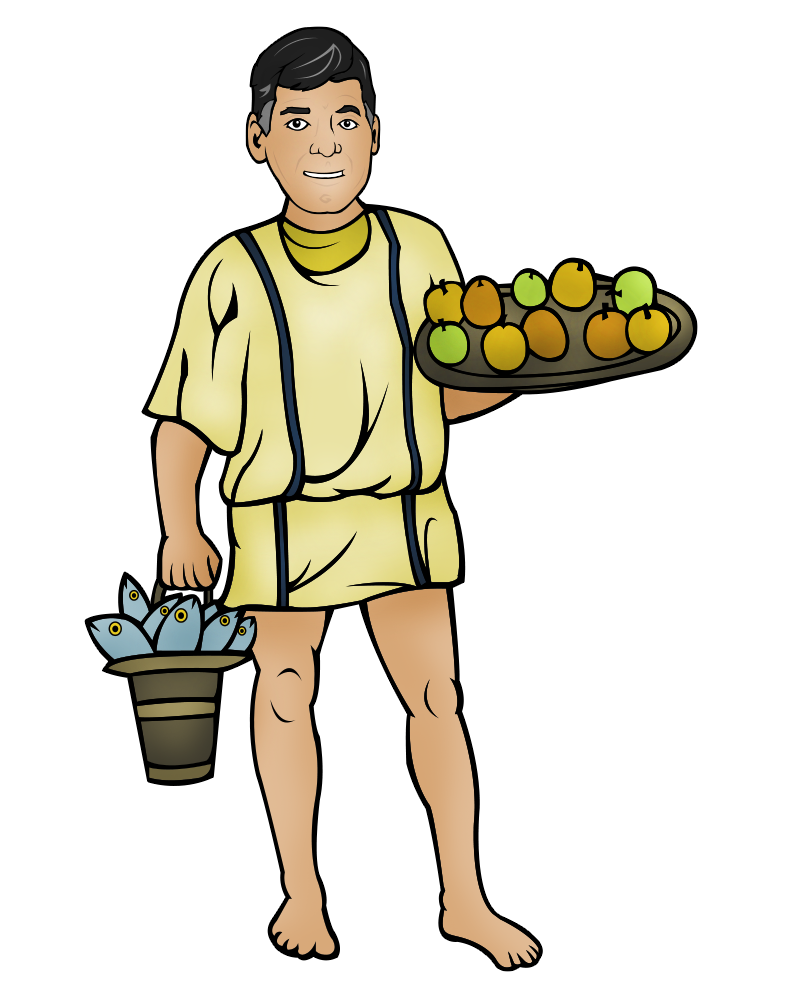CODEX 1.2
Please make your selection from the above CODEX menu options for Episode 1.2
KEY-TEXT
dē Marcō Sextōque
quis est Marcus? 
Marcus Maecēnās est vir nōtus. Marcus in vīllā Pompēiīs habitat. vīlla est māgna et māgnīfica.
Marcus multam pecūniam in vīllā habet. Marcus est dīves! Marcus quoque multōs amīcōs habet. ille quoque multam potentiam habet. Marcus tamen plūs pecūniae vult. Marcus quoque plūs potentiae vult.
Marcus Maecēnās quoque est senex. Marcus multōs annōs nātus est. Marcus multōs capillōs nōn habet. Marcus est paene calvus! Marcus saepe togam candidam gerit.
ille quoque Societātem Potentium dūcit. Marcus est dūx clārus. Societās Potentium Lapidem cupit.
Sextus Marcō nōn placet. Sextus est inimīcus.
quis est Sextus? 
Sextus Aemiliānus est vir nitidus. lux ā Sextō vēnit. Sextus lūcet. est mīrābile! sed sōlum Recentiī lūcem ā Sextō venientem vident. nēmo aliud lūcem videt.
Sextus quoque in vīllā māgnā Pompēiīs habitat. fortasse Sextus multam pecūniam habet. fortasse Sextus multam potentiam habet.
Sextus Aemiliānus est senex. Sextus multōs annōs natus est. ille capillōs in capite nōn habet. Sextus est calvus! circum caput, Sextus corōnam hederae gerit. saepe togam candidam gerit.
ille Mīlitēs Lapidis dūcit. Sextus quoque est dūx clārus. Mīlitēs Lapidis populum et Lapidem servant. Marcus Sextō nōn placet quod Marcus potentiam vult.
Sextus saepe auxilium Recentiīs dat.
KEY-TEXT B
dē Tiberiō
Tiberius est puer bonus. Tiberius Pompeiīs habitat. Tiberius in vīllā magnā Pompeiīs habitat. 
puer patrem habet. puer mātrem habet. puer patrem mātremque habet. Tiberius quoque canem habet.
canis in villā nōn habitat. canis prope villam in viā dormit. canis saepe latrat atque canis in viā dormit.
puer in viā nōn dormit. Tiberius in vīllā dormit. Tiberius in cubiculō dormit. cubiculum est parvum. cubiculum nōn est māgnum.
cotidie Tiberius in ātriō ludit. Tiberius pilam habet. Tiberius saepe in ātriō pilā ludit.
pater Tiberiī saepe in tablinō labōrat. pater Tiberiī est argentārius. pater saepe pecūniam numerat. pater Tiberiī pecūniam amat. pater Tiberiī multam pecūniam habet. nōmen patrī est Caecilius.
māter Tiberiī saepe in hortō (in peristȳlō) laborat. hortus multās florēs habet. māter Tiberiī florēs amat. māter Tiberiī multās florēs habet. florēs multōs colorēs habent. nomen mātrī est Metella.
 familia Tiberiī habet multōs servōs. nōmen unō servō est Euphorbus. Euphorbus est coquus et in culinā laborat. Euphorbus saepe cēnam optimam parat.
familia Tiberiī habet multōs servōs. nōmen unō servō est Euphorbus. Euphorbus est coquus et in culinā laborat. Euphorbus saepe cēnam optimam parat.
unō diē, Tiberius ē villā exit et ad arborem in agrō currit. Tiberius saepe prope arborem ludit. arbor est prope Montem Vesuvium. Tiberius saepe montem spectat.
Marcus, malus senex, quoque ad arborem ambulat. Marcus Tiberium quaerit quod Marcus īnfōrmātiōnem vult. Marcus Lapidem vult et saepe dē Lapide putat. Marcus locum Lapidis vult.
Informational Text
Domus Rōmāna
domus Rōmāna habet multa conclāvia: ātrium, cubicula, tablīnum, peristȳlium, culīna, et trīclīnium.

ātrium (I) est prīmum conclāve. familia intrat in ātrium et hospitēs exspectant in ātriō.
in ātriō sunt cubicula (II). in cubiculīs, familia dormit. cubicula nōn sunt māgna. cubicula sunt parva. lectus est in cubiculō. persōna in lectō in cubiculō dormit.
per ātrium est tablīnum (III). in tablīnō, pater familiae labōrat. est mēnsa in tablīnō. sunt multa volūmina in tablīnō. sunt multae tabellae in tablīnō.
prope tablīnum sunt peristȳlium (IV), culīna (V), trīclīnium (VI). in culīnā, servī et servae cibum coquunt. in trīclīniō, familia reclīnat et cibum cōnsūmit.
peristȳlium est hortus in domō. in peristȳliō saepe sunt arborēs et flōrēs et statuae et fontēs.
GRAMMATICA
-m
| Subject (nominative) | Direct Object (accusative) |
| charta | chartam |
| malus | malum |
| Lapis | Lapidem |
Operative, please note the role of the ending -m in these pairs of words.
Malus relinquit chartam
The bad man leaves behind a map: chartam is the object of relinquit
prope saxum
next to the rock: saxum is the object of prope.
In the above example, malus is the subject of the verb relinquit, because the bad man is the one doing the leaving. The chartam is the object of the verb relinquit, because the map is the thing being acted upon (that is, the map is what is being left behind). In Latin, we give the subject an ending frequently referred to as the nominative case, while the object is given an ending called the accusative case.
Operative, you are advised not to get too comfortable with -m! We regret to inform you that -m will be used for several different things (for example, saxum ends with -m in its subject-form, also), and that other endings will be used for objects as well. For now, it is most important that you be aware that the difference between subject and object is indicated in Latin by the use of different endings.
You may find it helpful to view this video about the nominative and accusative cases courtesy of latintutorial.com.
-issimus
Operative, -issimus is the ending of an adjective (descriptive word) called the superlative. It’s very similar to our English ending “-est.” the largest, fastest, etc.
VERBA
| charta | map | noun |
| clāmat | she/he shouts | verb |
| dēbet | she/he should | verb |
| iānua | door | noun |
| nitidus | shiny | adjective |
| potēns | powerful | adjective |
| prope | near | preposition |
| rāmus | stick, branch | noun |
| relinquit | she/he leaves behind | verb |
| saxum | rock, stone | noun |
CULTURALIA
Operative, in this TSTT-immersion, the TSTT employs our priceless knowledge of the Roman town of Pompeii to assist you in reaching mission objectives.
You may find information about Pompeii through the following links, and you are advised to do so as necessary in order to improve your TSTT-attunement. In particular, the Demiurge advises that you learn as much as you can about daily life (what Romans ate, what Romans wore, what Romans did all day) in Pompeii, in order to function as efficiently as possible in your TSTT-immersions. The display of this attunement will be registered by the TSTT and rewarded with additional Latinity Points.
The Demiurge advises that a working knowledge of the structure of the Roman house will be of utmost importance in fulfilling mission objectives on several levels. Operatives will need to be able to find things in a Roman house. They will also be called upon to make important conceptual analysis of the relation of the structure of the Roman house to the workings of Roman society more general. The Demiurge therefore advises operatives to study the following diagram carefully, and use it as a guide to your actions in your TSTT immersions.
The Demiurge also advises that operatives dig deeper into the structure of the Roman house. In the following image, you will see the important features of the atrium of the Roman house, especially the larārium and the lectus geniālis. The Demiurge advises that you consider whether there are similar items to be found in modern houses.
Sextus' villa in the TSTT's version of Pompeii is actually the very real House of Menander, excavated between 1926 and 1932. Operatives are encouraged to explore the features of this sprawling home.
ATTUNEMENT
1.2.a
Directions: Choose the correct word to complete the sentence about Sextus. Then translate the sentence.
1. (Sextus / Sextum) persōnam tuam dūcit.
2. Sextus (Lapis / Lapidem) nōn habet.
3. Sextus est (nitidus / nitidum).
4. (Marcus / Marcum) Sextum nōn dēlectat.
5. (iānua / iānuam) aperit Sextus.
1.2.b
Directions: Based on the conversation with Sextus dē Lapide et Marcō, write down three important facts about the Lapis and three facts about Marcus.
dē Lapide
1.
2.
3.
dē Marcō
4.
5.
6.
1.2.c
Directions: Answer the questions in English, based on the Latin vocabulary word. Be sure to include the Latin vocabulary word in your answer!
1. When might you use a charta?
2. What kind of animal might live on a rāmus?
3. Give an example of one thing you are wearing or might wear that is nitidus.
4. Name something that might make you ānxius.
5. When does a friend agit grātiās to you?
1. What are some of the key rooms inside of a typical Roman house? What are the equivalents in a modern house?
2. Where do you think most of the social activity took place inside of a typical Roman house? Why do you think that?
3. Briefly describe a Larārium and a lectus geniālis. Are there items like this in modern houses? What would happen if you didn’t honor your Lār?
1.2 KEY-TEXT Comprehension Questions
Directions : Answer the following comprehension questions based on the KEY-TEXT in complete Latin sentences.
1. quis Societātem Potentium dūcit?
2. ubi Marcus habitat?
3. dēlectatne Sextum Marcus?
4. ubi Sextus habitat?
5. quis Mīlitēs Lapidis dūcit?
6. quid Mīlitēs Lapidis servant?
1.2 Memorātiō
- quis in vīllā habitat?
- quis est prope vīllam?
- quid Marcus dēsīderat?
- quis Marcum nōn dēlectat?
- quid venit dē Sextō?
- ubi Sextus tuam persōnam dūcit?
- dē quō Sextus dīcit?
